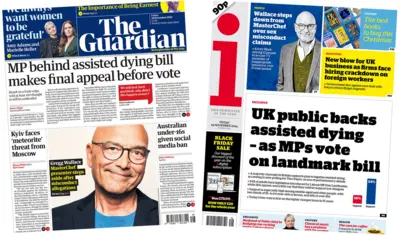We've updated our Privacy and Cookies Policy
We've made some important changes to our Privacy and Cookies Policy and we want you to know what this means for you and your data.
Ofcom boosts 4G coverage plan in rural 'not-spots'
Top Stories
Ofcom has revised proposals for its fourth-generation mobile spectrum auction, adding measures that could bring coverage to 98% of the UK.
The regulator said the winning bidder will have to provide the high-speed coverage to current "not-spot" areas.
It said the measures would help bring fast mobile internet to parts of the country that are underserved.
The bidding process for the spectrum is still scheduled for the end of this year, Ofcom said.
A 10-week consultation period into the revisions will now begin ahead of Ofcom's final decision on the precise details of the auction.
Top Stories
In a statement, Ofcom chief executive Ed Richards said: "We are proposing a significant enhancement of mobile broadband, extending 4G coverage beyond levels of existing 2G coverage - helping to serve many areas of the UK that have traditionally been underserved by network coverage."
Ofcom had previously proposed that a "special condition" be added to oblige the winning bidder to roll out a 4G network to 95% of the UK population.
It now said it wants to extend that reach to 98%, by allowing the mobile operator to effectively piggyback already planned government investment into boosting 2G coverage in remote rural areas.
Ofcom argues this stipulation will encourage the operator to invest in areas that are of most benefit to the UK.
Switchover
When the nationwide switchover to digital television is complete, spectrums that are currently being used for analogue transmission will be offered to mobile operators.
The 800MHz slice - which has been freed up by the switchover to digital TV - allows mobile signals to travel over greater distances, making it invaluable in the search to find ways of bringing broadband to rural areas.
Top Stories
The higher capacity 2.6GHz band will be more useful in towns and cities where lots of users require services.
The auction will sell off a huge chunk of available spectrum, equivalent to three-quarters of the mobile spectrum in use today.
Ofcom had promised that Three and Everything, Everywhere - a merger of T-Mobile and Orange - would both be guaranteed a space on the 800MHz band, which at present is only being used by Vodafone and O2.
That promise is not part of the revised proposal.
Ofcom's statement said: "Because of their current spectrum holdings, and/or the much lower risk that these national wholesalers would fail to acquire further spectrum in the auction, we do not consider it necessary to reserve any spectrum for Everything Everywhere, [O2 owner] Telefonica or Vodafone.
"We therefore think it is appropriate, and so propose to, in effect, reserve some of the available spectrum for a fourth national wholesaler, by which we mean a bidder other than Everything Everywhere, Telefonica or Vodafone."
Ofcom chief executive Ed Richards added: "This is a crucial step in preparing for the most significant spectrum release in the UK for many years.
"The UK benefits from being of the most competitive mobile phone markets in Europe.
"Ofcom's objective is to promote effective competition and to stimulate both investment and innovation."
'Disappointed'
However, Everything, Everywhere has said it was "disappointed" by the decision.
A spokesperson said: "Ofcom is missing a huge opportunity for the UK to address the imbalance in sub 1GHz spectrum holdings, which has damaged consumer interests for the last 20 years - and is a situation which is now threatening to continue.
"The importance of sub 1GHz spectrum, which delivers service and cost benefits, has been recognised by other regulators across Europe and supported by economic analysis."
The reaction from other mobile operators has been largely positive.
David Dyson, chief executive of Three, described the measures as "pragmatic" in ensuring the "prospects of a competitive market".
"We urge Ofcom and the government to maintain momentum now and to ensure the auction is delivered in 2012 as planned," he added.
A Vodafone spokesperson said: "We welcome Ofcom's revised proposals, which bring the UK closer to a fair and open auction that will benefit the wider economy, increase competition and ultimately lead to the creation of innovative and exciting new services for consumers.
"Ofcom has produced a lengthy document and we need to understand the regulator's rationale for protecting a fourth operator, but it has made significant steps towards bringing 4G services to this country."
A spokesperson from O2 said: "As we have said throughout this process, the key objective of the 4G auction should be to ensure that operators are able to exploit the full potential of the spectrum."
Top Stories
More to explore
Most read
Content is not available








